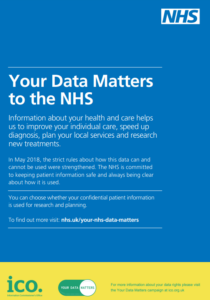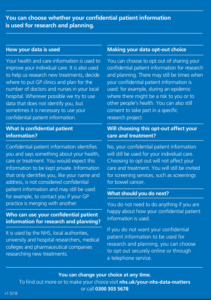The Information we hold and where we hold it
Confidentiality is at the heart of good medical practice and is based upon mutual trust and confidence.
Patients’ health records are kept by the practice with which they are registered and the hospital or NHS trust which treats them. Each health professional is responsible for the accuracy and safekeeping of health records.
The records include general information like name, address and date of birth. They also contain details of care such as consultations, illnesses, investigations undertaken, prescriptions received and treatment carried out.
When Patients change their GP, health records are returned to the Primary Care Services England (PCSE) to be forwarded onto the new practice, and if necessary, hospital records can be passed onto the local hospital.
The law strictly controls the management of all personal information:
- Anyone who received information about you has a legal duty to keep it confidential.
- You have a right of access to your health records, with some exceptions.
- Your right of privacy allows you to keep your health records confidential between you and your health professional, with some exceptions.
The National Data Opt Out programme
Sharing your records: your personal information
Information about you is used in a number of ways by the NHS and social care services to support your personal care and to improve health and social care services for everyone.
The NHS Digital (NHSD) is the national NHS organisation with a legal responsibility to collect data as people make use of NHS and social care services. The data is used both at a local level and nationally to help with planning, managing your care, supporting research into new treatments, identifying trends and issues and so forth, and is used to try to make services better for all.
You can, however, choose not to have information about you shared or used for any purpose beyond providing your own treatment or care.
Your right to opt out
You can choose not to have anything that could identify you shared beyond your GP practice (Type 1 objection). You can also choose for the NHSD not to share information it collects from all health providers any further (previously known as Type 2 objection, now National Data Opt-out).
If you have previously told your GP practice that you don’t want the NHSD to share your personal confidential information for purposes other than your own care and treatment, your opt-out will have been implemented by the NHSD from July 31 2022. It will remain in place unless you change it.
You can find more information about how the HSCIC handles your information and choices and how it manages your opt-out on the HSCIC website www.hscic.gov.uk/yourinfo
Research
This practice is part of the local Primary Care Research West Midlands North (PCR WMN). The network is funded by the Department of Health to undertake research to improve health. We support various types of research in the practice. Research is an important part of healthcare, used to learn more about illness: how to prevent it and how to treat it.
Research involves patients taking part in interviews, postal questionnaires or being invited to take part in a clinical trial. The quality of research is carefully checked by the people who fund the research and Research Ethics Committee.
Your right to medical care will not be affected in any way if you do not wish to take part, as involvement is entirely voluntary, you may change your mind even if you have agreed to take part. We may be asked to share information we hold in medical records as part of the research. Confidentiality
You can choose whether your confidential patient information is used for research and planning. To find out more visit nhs.uk/your-nhs-data-matters. Or read leaflet available on reception ‘Your Data Matters to the NHS’, and below:


More information can be found at: nhs.uk/your-nhs-data-matters
Sharing your records: your personal information
Information about you is used in a number of ways by the NHS and social care services to support your personal care and to improve health and social care services for everyone.
The NHS Digital (NHSD) is the national NHS organisation with a legal responsibility to collect data as people make use of NHS and social care services. The data is used both at a local level and nationally to help with planning, managing your care, supporting research into new treatments, identifying trends and issues and so forth, and is used to try to make services better for all.
You can, however, choose not to have information about you shared or used for any purpose beyond providing your own treatment or care.
Your right to opt out
You can choose not to have anything that could identify you shared beyond your GP practice (Type 1 objection). You can also choose for the NHSD not to share information it collects from all health providers any further (previously known as Type 2 objection, now National Data Opt-out).
If you have previously told your GP practice that you don’t want the NHSD to share your personal confidential information for purposes other than your own care and treatment, your opt-out will have been implemented by the NHSD from July 31 2022. It will remain in place unless you change it.
You can find more information about how the HSCIC handles your information and choices and how it manages your opt-out on the HSCIC website www.hscic.gov.uk/yourinfo
Privacy Notice
Please access our Privacy Notice via the Main Menu.
Office of the Information Commissioner
Find out about your data protection and information rights including how to make a SAR, how to make an FOI request, domestic CCTV and data protection, protecting yourself against nuisance marketing and more.
https://ico.org.uk/for-the-public/